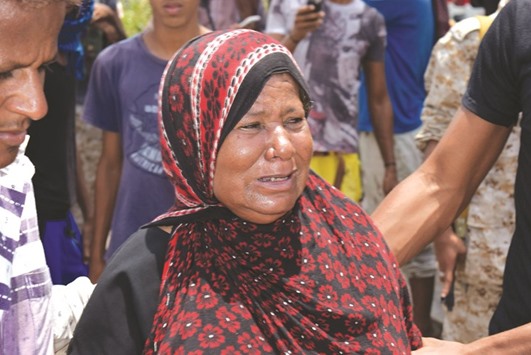Twin bombings claimed by the Islamic State group hit Yemeni forces in Aden yesterday, killing at least 41 people in the latest of a spate of attacks in the southern city.
The attacks in Aden - which is serving as the temporary government headquarters after rebels forced authorities from the capital - follow a major military operation against militants in parts of southern and southeastern Yemen.
Backed by a Saudi-led coalition, forces loyal to President Abd-Rabbu Mansour Hadi are battling both IS militants and Iran-backed Shia rebels.
In the first attack, a suicide bomber killed 34 people queuing to enlist at a recruitment centre near the Badr base in Aden’s Khormaksar district, said Brigadier General Nasser al-Sarei, the commander of Yemen’s special security forces.
A subsequent explosion inside the base killed seven soldiers, he said.
Medics said that 38 people were wounded in the twin attacks.
In a statement posted online, IS said one of its fighters detonated an explosives belt at a recruitment centre, followed by the bombing at a gate of the Badr base.
A local resident in Aden described the scene of the Badr explosions as “horrible”, saying body parts had been blown dozens of metres away.
“They came to complete the procedure of their recruitment and receive their first salary,” he said, speaking of the young men who had gathered outside the army centre.
Abandoned slippers and sandals, apparently from the victims, covered the area, television footage showed.
Aden resident Ramzi al-Fadhli said “wailing filled the air” as women identified the remains of relatives at Al-Jumhuriyah Hospital, where at least 32 bodies were taken.
Aden has seen a wave of attacks in recent months claimed by Al Qaeda or its militant rival IS after government forces drove Shia Houthi rebels out of the port city in July with support from the Saudi-led coalition.
The coalition launched operations in Yemen in March last year after the rebels seized control of Sanaa and other parts of the country, forcing Hadi’s government to flee the capital Sanaa.
Al Qaeda - which has a long presence in the Arabian Peninsula country - and IS have exploited the power vacuum created by the conflict to expand their zones of control in the south and southeast.
Over the past two months, government and coalition forces have hit back, driving Al Qaeda militants out of the Hadramawt provincial capital of Mukalla, which they had controlled for a year.
But attacks on security forces have left scores dead.
On May 1, four guards were killed in a bombing that targeted the convoy of Aden’s police chief General Shallal Shayae, in the second such attack on him in a week.
Several attacks have also targeted troops in Hadramawt since government forces ended Al Qaeda rule in Mukalla.
Earlier this month, 47 police were killed in a series of bombings near Mukalla.
UN-sponsored peace talks between the government and rebels resumed yesterday in Kuwait after they had broken off a week ago.
The government had demanded a written pledge from the rebels and their allies recognising an April 2015 UN Security Council resolution calling for their withdrawal from the capital and other territories, as well as the legitimacy of Hadi.
Yemen foes hold face-to-face talks after long pause: UN
Yemen’s warring parties held their first face-to-face meeting in nearly a week yesterday after the government delegation ended a boycott, the UN envoy said.
“A joint meeting between the two delegations to the Yemen peace talks has started in the morning,” Ismail Ould Cheikh Ahmed said on Twitter.
The troubled negotiations which began on April 21 broke off on Tuesday when the government delegation suspended its participation accusing Iran-backed rebels who control the capital of failing to keep their word.
The government demanded a written pledge from the Houthi Shia rebels and their allies recognising an April 2015 UN Security Council resolution calling for their withdrawal from the capital and other territories they have overran since 2014, as well as the legitimacy of President Abd-Rabbu Mansour Hadi.
Hadi had agreed to end the latest boycott after mediation by UN chief Ban Ki-moon and Qatar’s Emir HH Sheikh Tamim bin Hamad al-Thani, the UN special envoy said on Sunday.
Foreign Minister Abdulmalek al-Mikhlafi said on Twitter on Sunday that the government had agreed to give the peace talks a “last chance.”
“We have fixed all the references. This is a first step on the path for a real peace that leads to implementing Resolution 2216 beginning with withdrawals, surrender of weapons and the restoration of state institutions,” he said.
Despite a 14-month-old Saudi-led military intervention in support of Hadi’s government, the rebels and their allies still control many of Yemen’s most populous regions, including the central and northern highlands and the Red Sea coast.

A Yemeni woman reacts at the site of a bomb attack that targeted Yemeni forces in Aden’s Khormaksar district yesterday.
